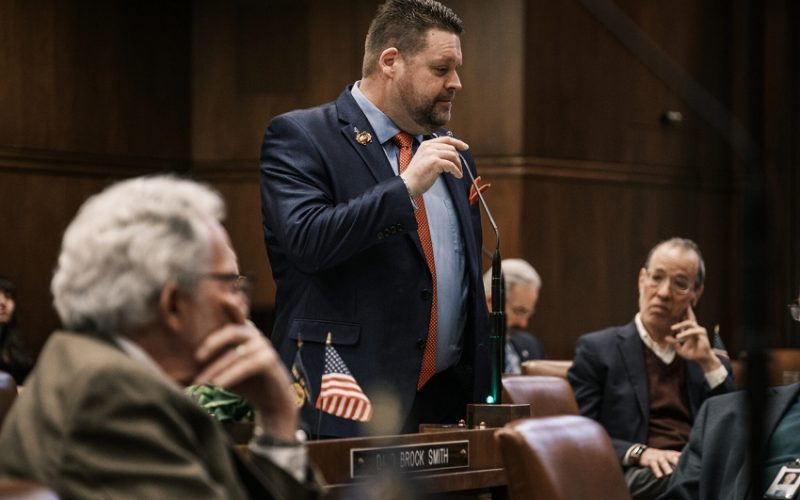Salem, OR – Thousands of Oregonians voiced their opposition to a Republican senator’s proposal to repeal the state’s long-standing mail voting system, flooding the Legislature’s website on Monday with written testimony and comments. The uproar, sparked by Senate Bill 210, could signal a significant battle if the bill, or a similar initiative, makes its way to the 2026 ballot.
Introduced by Senator David Brock Smith, a Republican from Port Orford, the bill aims to ask voters whether to repeal Oregon’s nearly 25-year-old vote-by-mail system, which was implemented after nearly 70% of voters approved the change in 1998. Since then, Oregon has become a pioneer in mail-in voting, with the system now the cornerstone of its elections.
Brock Smith argues that it is time for Oregonians to decide again whether they want to continue with the system. “I think it’s time, which is why this is a referral for Oregonians to either reaffirm or deny vote-by-mail in this state,” he said during a Senate Rules Committee hearing on Monday.
If passed, the bill would ask voters to approve a switch from mail voting to in-person voting on Election Day starting in 2028. It would also repeal several recent voting laws, including those that provide prepaid return envelopes for ballots and extend the deadline for ballots to be counted up to a week after Election Day, provided they are postmarked by that date.
In addition, the proposal would allow voting by mail only for those who are unable to vote in person on Election Day, with voters required to request ballots at least 21 days before an election and submit identification such as a driver’s license or U.S. passport.
The bill’s introduction has sparked a fierce debate, with many supporters of the current system pointing to Oregon’s high voter turnout and the convenience it offers. Advocates argue that Oregon’s mail-in voting system has made elections more accessible, particularly for rural residents, disabled individuals, and those with tight work schedules.
More than 11,000 Oregonians submitted written testimony against the bill, temporarily crashing the legislative website and overwhelming the Senate Rules Committee with opposition. Over 85% of the letters submitted voiced disapproval, with many highlighting the benefits of mail-in voting for people who face barriers to voting in person.
“I live in a rural community with a lot of people that lack accessibility or ability to get to a polling center,” said Renee Asher, a Coos County resident who attended the hearing virtually. “We don’t have polling centers here. You have people that work multiple jobs, as I do myself, and we face voter intimidation in our area. I think that it would be a big mistake to repeal mail-in voting.”
Erin Otey, a night shift nurse from Oregon City, also testified against the bill, emphasizing how essential mail-in ballots are for vulnerable populations, including elderly and disabled individuals who are unable to visit polling places. “These people are bedbound,” Otey said, referring to her patients. “Even people that are housebound wouldn’t have the opportunity to get to an in-person place, and it would put their health further at risk.”
Despite the overwhelming opposition from citizens, proponents of the bill argue that voting should be about personal responsibility, not convenience. Rep. Court Boice, R-Gold Beach, stated that he represents a majority of people who believe Election Day should focus on responsibility, not ease of access. He emphasized that he was merely responding to the will of his constituents, who feel strongly that voting should require a more traditional, in-person experience.
The bill’s critics, however, argue that it would undo progress Oregon has made in making elections more inclusive. Senator James Manning, a Democrat from Eugene, questioned whether the bill was an answer to a problem that didn’t exist. “I’m trying to figure out if this is an issue looking for a problem, because I don’t see it here in our state,” Manning said. “I think this is a national movement to try to make something of nothing.”
Oregon’s mail-in voting system is widely regarded as a success story in the state, with voter turnout consistently outpacing the national average. Since the state switched to all-mail elections, it has been praised for increasing participation, especially among historically underrepresented groups.
The bill faces an uphill battle in the Democratic-controlled Senate, where it is not expected to pass. However, the outpouring of opposition to Senate Bill 210, along with similar efforts on the national stage to curtail mail-in voting, suggests that the debate over how Oregon conducts its elections may continue to evolve. Should Brock Smith’s proposal or a similar initiative reach the 2026 ballot, it could become one of the most contentious issues for Oregon voters in recent memory.
As the debate rages on, one thing is clear: Oregonians are deeply invested in their right to vote by mail, and they are prepared to defend it at all costs.











